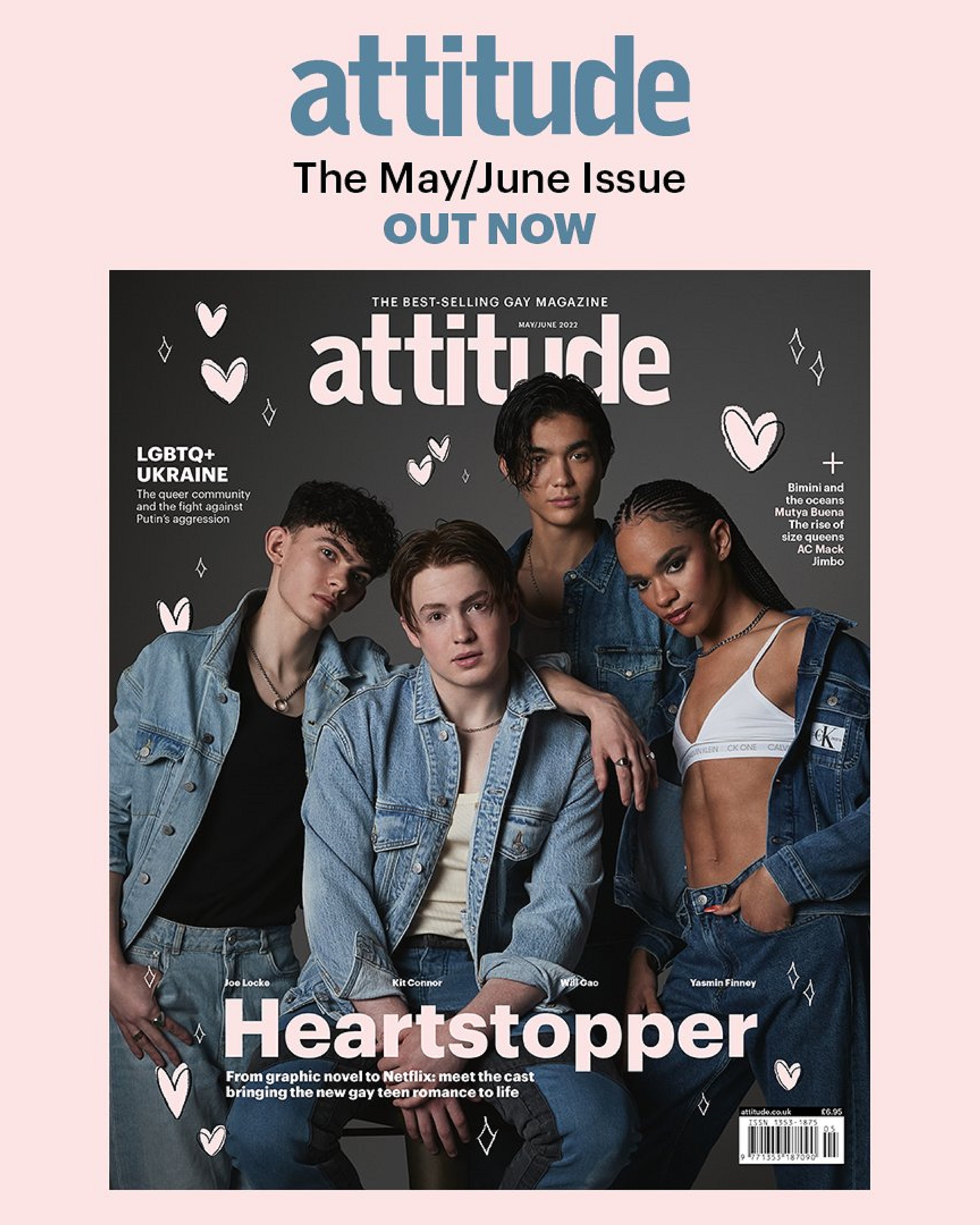‘The war with Russia makes it extra difficult and dangerous for LGBTQI people in Ukraine’
Attitude hears from those whose are fighting for hope and freedom as their country is torn apart.
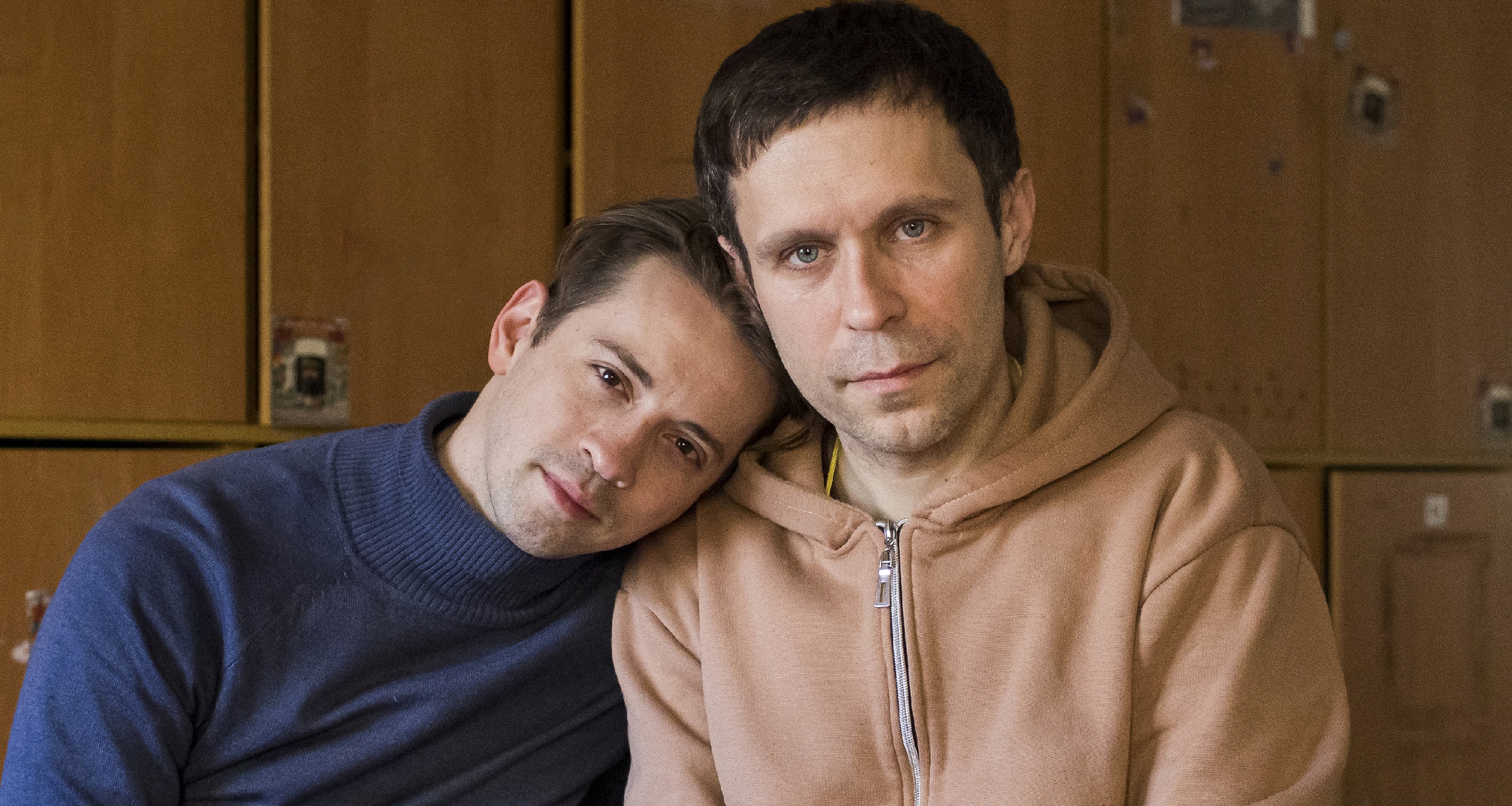
Words and pictures: Ilvy Njiokiktjien
With the help of Kyiv Pride executive director Lenny Emson, photographer and reporter Ilvy Njiokiktjien travelled to the city of Lviv in Ukraine to meet the LGBTQ+ community in a country fighting for its survival against an unrelenting Russian invasion.
Denys Kratt (he/him)
Denys, 48, works as a marketing director of a Czech microbrewery/restaurant and is a drag queen. He and Dima, 34, a confectioner, have been together for 11 years. They are currently living and volunteering in the Lviv brewery/restaurant where Denys works, which has now been repurposed as a shelter for LGBTQI refugees.
Denys’ house in Kharkiv and his parents’ apartment were decimated during the first days of the war.
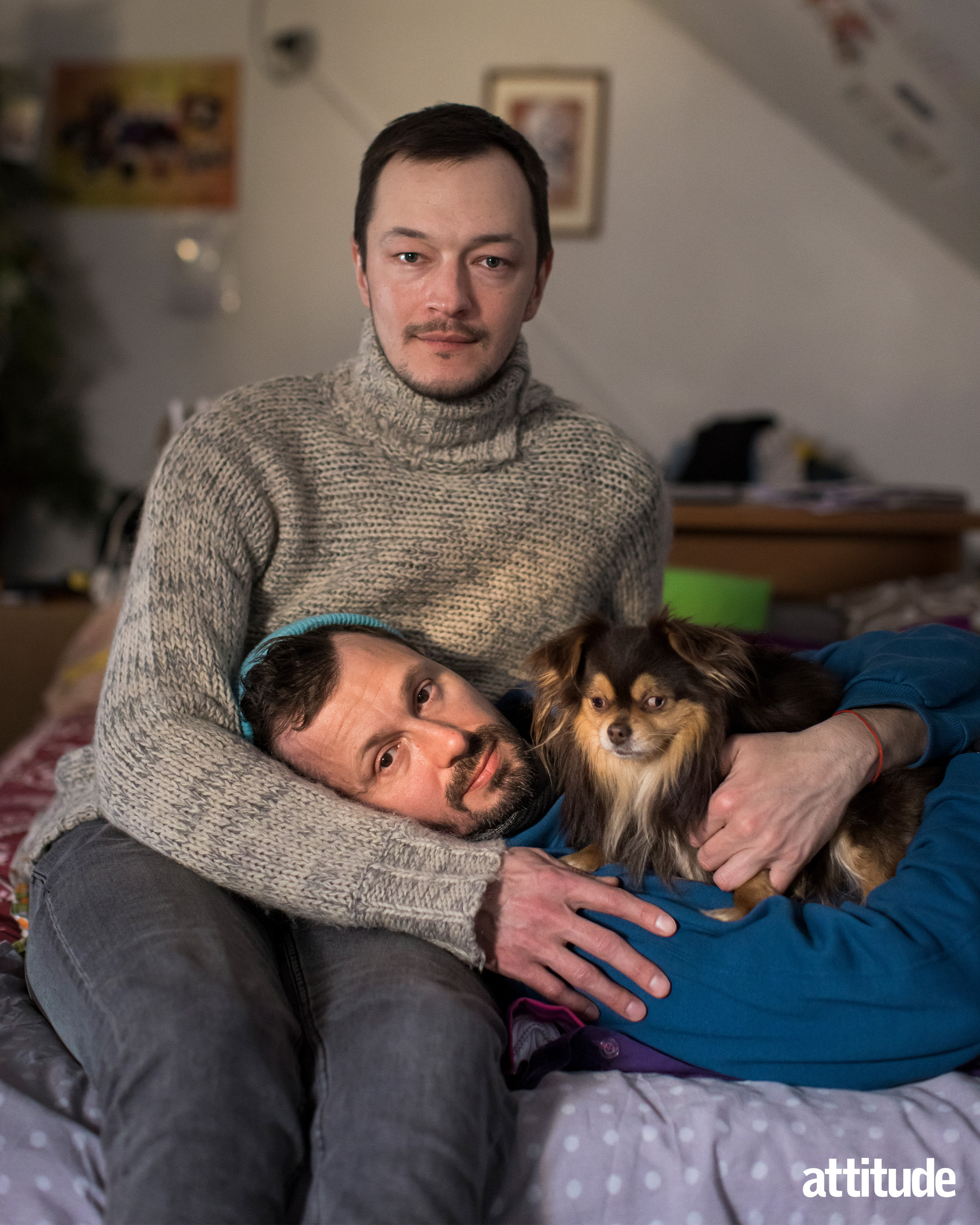
Denys and Dima
I have never had a normal life. In this country I have lived through a revolution, an occupation, a crisis in the 90s and, as an LGBTQI, we receive a lot of discrimination. I am so tired. I want to stay alive. Russian bombs and aeroplanes with rockets destroyed my flat, my parents’ apartment. Everything I own, my car — even my two cats — is gone. In the first days of the war, I did not know if my mother was still alive — she was in Kharkiv and I was in Lviv for work.
Eleven years ago, Dima and I met in Kharkiv, where we both grew up. For the first part of our relationship, we couldn’t see each other at home because we were still living with our parents. We would meet in parks or in clubs.
After four years, we were able to live together in an apartment in Kharkiv that I inherited from my grandparents. The building is home to a lot of old people. Even though we never talk to them about us being gay, I have the feeling they somehow know. I never came out to my mother, even though she knows and understands it. Dima’s parents don’t know he is gay. He doesn’t want to publish pictures of us on Instagram, in case his family see them.
From February onwards, I stayed in Lviv because of the war, and Dima followed me there. We are now staying in the restaurant where I work, and have invited other LGBTQI friends who need a place to stay.
I studied art in middle school and wanted to continue studying it at the University of Theatre, Cinema and Television in Kyiv. But my parents told me that this was not a serious degree suitable for a man, so I went to study physics at university. There, I joined the theatre club where I could explore my passion.
In better times, I am also the drag queen, Zhanna. I started doing drag at the beginning of 2000. I like going to gay prides, performing in Kharkiv and attending Pride in Kyiv. At Pride in Kyiv, it is a bit shocking because the whole route is closed off by police out of fear that people will attack us. I have also been to Amsterdam a couple times to perform.
The war with Russia makes it extra difficult and dangerous for LGBTQI people. Putin has a totally different idea of ‘freedom’. We would lose our freedom if it was up to Putin. If the borders open, I will leave. I am afraid that I am on the ‘kill list’, which apparently exists. It lists names of people who have said or done ‘controversial things’. I have been depicted in Russian media as an extremist, after I made a political comment about Crimea being part of Ukraine during the Pride in Kyiv in 2015. I also said that Crimea should have a gay pride parade. Even though I am scared about speaking out and performing, I still do it, to fight for our freedom.
Tamara Khrustalova (she/her)
Tamara, 43, and Natalia Kravchenko (she/her), 46, live together and have two sons, Glib, 12, and Oleksii, 11, and two cats, Tima and Rysia. Their home is in Kyiv, but they have fled to Lviv. When the air-raid sirens go off, they hide in the hallway. All the windows of the house are taped, so that broken glass can’t fly inside.
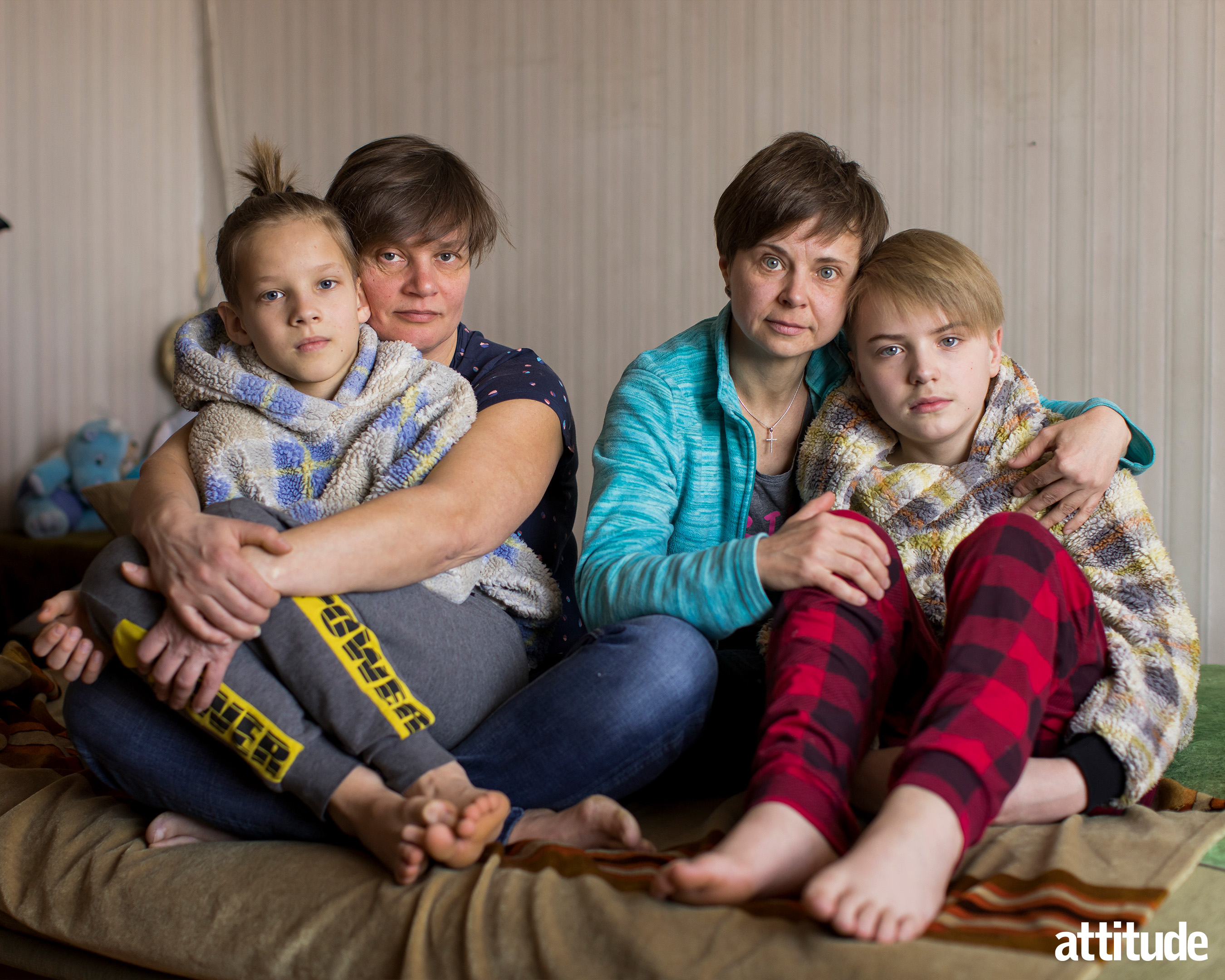
From left to right: Oleksii, Natalia, Tamara, and Glib
We travelled by train from Kyiv to Lviv two and a half weeks ago. We did not bring many belongings: we couldn’t. We brought our clothes, our two cats and a computer. There were hundreds of people waiting for the evacuation trains, and it was extremely busy. The lucky ones would get on, you really had to push your way through. It was very crowded. The children found a small place in between the seats to sit down and be more comfortable. The train journey took around 11 hours.
Now I am working at a LGBTQI refugee shelter set up by an organisation called Insight. The people volunteering in the shelter all know each other indirectly from Kyiv, although our community is quite big.
I speak English, so that is quite helpful. I clean the shelter, and buy groceries or medicines. There are several quite specific ones, such as hormones for our trans community. Some of these are donated from the Netherlands or other countries in Europe. Almost every day, I go to the chemist to buy these for the people in the shelter.
Some of the hormone medications — for instance, the one that stops the growth of the larynx — are not available here in Lviv, or even in neighbouring countries, like Poland. So, together with the team, I try to get this medicine from Germany. We also try to ship medicines and other things to the cities that are currently under siege.
It is a difficult process, but these people need to be helped as well.
I also assist people in crossing the border from Ukraine to Poland. I have helped a family do this. There is someone staying at the LGBTQI shelter now who is trans. It is difficult for them to cross, because they have an ‘M’ in their passport, stating the fact they were born male — males between the age of 18-60 are not allowed to leave the country.
To be part of the LGBTQI community in Ukraine is very difficult. We don’t speak about it. It is a secret. Even our two sons do not really know. I think they may have guessed, but we have never told them anything. We are afraid they might tell other kids in school and that those kids will tell their parents.
You just never know how people will react and we do not want to put that burden on our children.
We are not openly affectionate on the street. This is not possible in this country at the moment. We can hold hands, because people might think we are friends, but we can’t kiss in the street. We feel like a normal family, with a normal life and that is also how we behave.
We have been together for 15 years and we believe the rights of LGBTQIs are very important, but we do not demonstrate, or go to Pride. I don’t want to get into trouble: I have a family. There are people who come to the march just to hurt LGBTQIs. There are a lot of police to prevent this, but it still happens.
I wish Ukraine was more tolerant towards the LGBTQI community, but this is one of the many problems our country faces. The war does not change this for me, but what I do feel is happening during the war is that LGBTQIs are really there for each other and are sticking together.
That is beautiful.
Anton Levdyk (he/him)
The 44-year-old is a programme manager at the LGBTQI organisation Fulcrum, while his partner Alexander (he/him), 34, is a makeup artist. They left Kyiv on 24 February, the day the war started. It took them 24 hours to reach Lviv by car.
They are now living in the locker room of a restaurant in the city, which was offered to them by their friend Denys, who is also LGBTQI. As far as they know, their home in Kyiv is still intact.
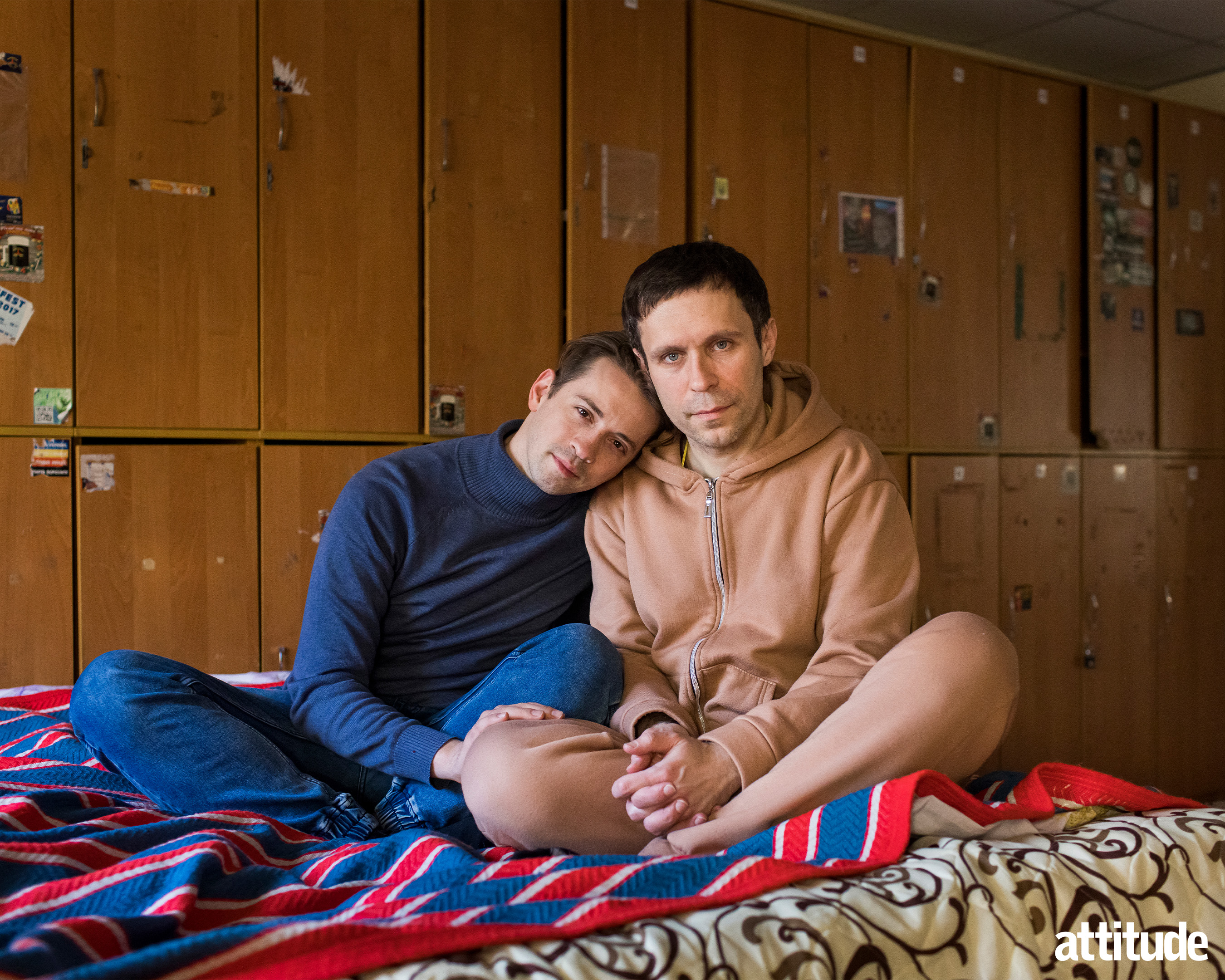
Alexander and Anton
Anton: It is challenging to be part of the LGBTQI community in Ukraine. Especially if you ‘look it’ as well. If you look like a drag queen, it can be dangerous. You can never hug in a public place. In a city like Mariupol, you might get beaten up; in Kyiv, it’s a bit more relaxed, but it all depends on where you are in the city.
Lviv is very closed-minded when it comes to the LGBTQI community. It’s a very Catholic city, which makes it difficult. In Kyiv, I’ve heard people say countless times: “We don’t have any gay or queer people in our city.” When we organised Pride, it was difficult to find somewhere to rent. One event location cancelled our booking when they found out it was for Pride.
The new gun laws in this country scare me. Now civilians can legally apply for a gun. During Pride a few years ago, we had people go on LGBTQI safaris as entertainment: they would go out and ‘hunt’ LGBTQIs in order to attack them.
I am scared about the war with Russia. I don’t think Russia will win, but if Ukraine became like Russia, I would not be able to live here. I think if that happened, LGBTQIs would have to leave the country.
After the war, the LGBTQI rights we have gained might be lost in time. I feel that people will have other priorities. Our cause would be at the bottom of the list.
The best scenario would be if Ukraine became part of the European Union. That would mean safety. Of course, this is a dream.
Alexander: I never went out as a couple with my previous boyfriend. But now that I am with Anton, we are more open about it. We don’t kiss or hold hands in the street.
I thought my friends were open-minded and that they would be OK with it, but they never accepted me being in a relationship with Anton. A lot of my friends turned their back on me — even friends I’d had for over five years. This was a total shock for me.
There is no equality yet for gays in this country. For instance, I like wearing makeup and I also work as a makeup artist. I sometimes wear a subtle smoky eye. This is possible in the centre of Kyiv, but I couldn’t go to another district.
One day, I wasn’t wearing makeup, but I was wearing some nice gold shoes. I lived in an area far from the city centre. When I entered an establishment with my gold shoes on, people were making negative comments and saying nasty things about gays. They even wanted to hurt me.
Natalie (he/she/they)
The 18-year-old queer/non-binary fled from Derhachi, a small town close to Kharkiv. She has a disability and is currently staying in Lviv at the LGBTQI shelter set up by Insight.
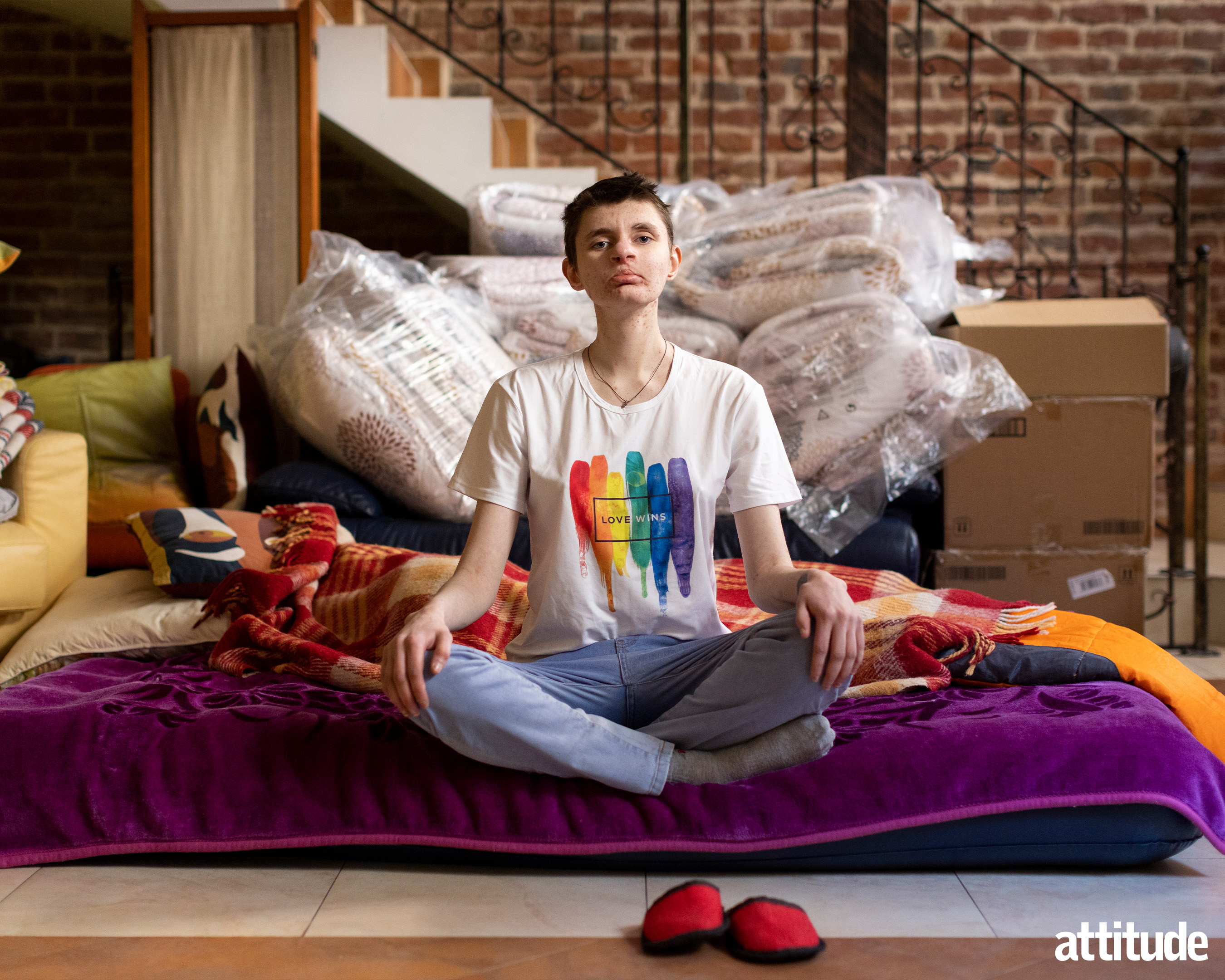
Natalie
I travelled by car to Lviv. I was with a family friend and we tried to find a driver, but when we found one, they had just closed Kharkiv city. Luckily, later on, we found volunteers who drove us to Lviv. The journey took three days.
The decision to leave took some time because travelling by train is dangerous now: no one can tell how long it will take to arrive because of the risk of shelling, and the conditions are horrible — too crowded, too hot. There is a lack of fresh air and you can’t get to the toilet because of the number of people.
After arriving in Lviv, I found my way to the LGBTQI centre via Instagram. I was so happy to find this place.
My plan is to go to Vilnius in Lithuania. There is a doctor there that might be able to do surgery on my jaw. I was born with a cleft lip and cleft palate and he is supposed to be the best doctor around.
I am not the most social person; I like my own space. I am a true introvert, partly because of my physical disability. I studied physics at university in Kyiv, but I could not finish the course because of my mental health. I have anxiety, depression, borderline personality disorder and ADHD.
In 2019, I tried to take my life for the second time, as a result of improperly prescribed medication. The situation with psychiatry is quite bad here in Ukraine, so I didn’t get proper help. My health started getting worse and I couldn’t continue studying.
I describe myself as queer and non-binary. When I was little, I wondered if I was a boy or a girl. When I was 14, I felt more like a boy. Nowadays, I don’t really define myself as one gender.
My mum always says that I can love whoever I want. My father passed away five years ago. He didn’t know about my sexual orientation and gender definition. He could be quite abusive; I’m quite glad he didn’t know about it. He was already aggressive.
It’s hard to be LGBTQI in Ukraine, but it depends on the city. When I wear a T-shirt with the rainbow flag on it, sometimes people come up to me to say there is no place here for people like us. People in Kharkiv could be mean sometimes. I have even been threatened with being thrown under a train, specifically to destroy the rainbow symbol.
Over the past few years, the police and law enforcement have become more active against violence towards the LGBTQI community.
I have a girlfriend who lives in Russia, which makes things extra difficult. We met three years ago through the internet. I was 15 years old at the time, but we have still not seen each other in real life due to the pandemic and now the war.
If Russia wins, everyone can forget about their human rights in this country. We LGBTQIs have been fighting for our rights for many, many years, and we will keep on fighting. We don’t want to live with Putin and without human rights.
Olesya Shnip (she/her)
The social worker, 38, is staying in a shelter in Lviv with her transgender partner Evgeny Sokolov, (he/him), 46, who is an artist, woodworker, and linguist in the Russian language. He is from Russia.
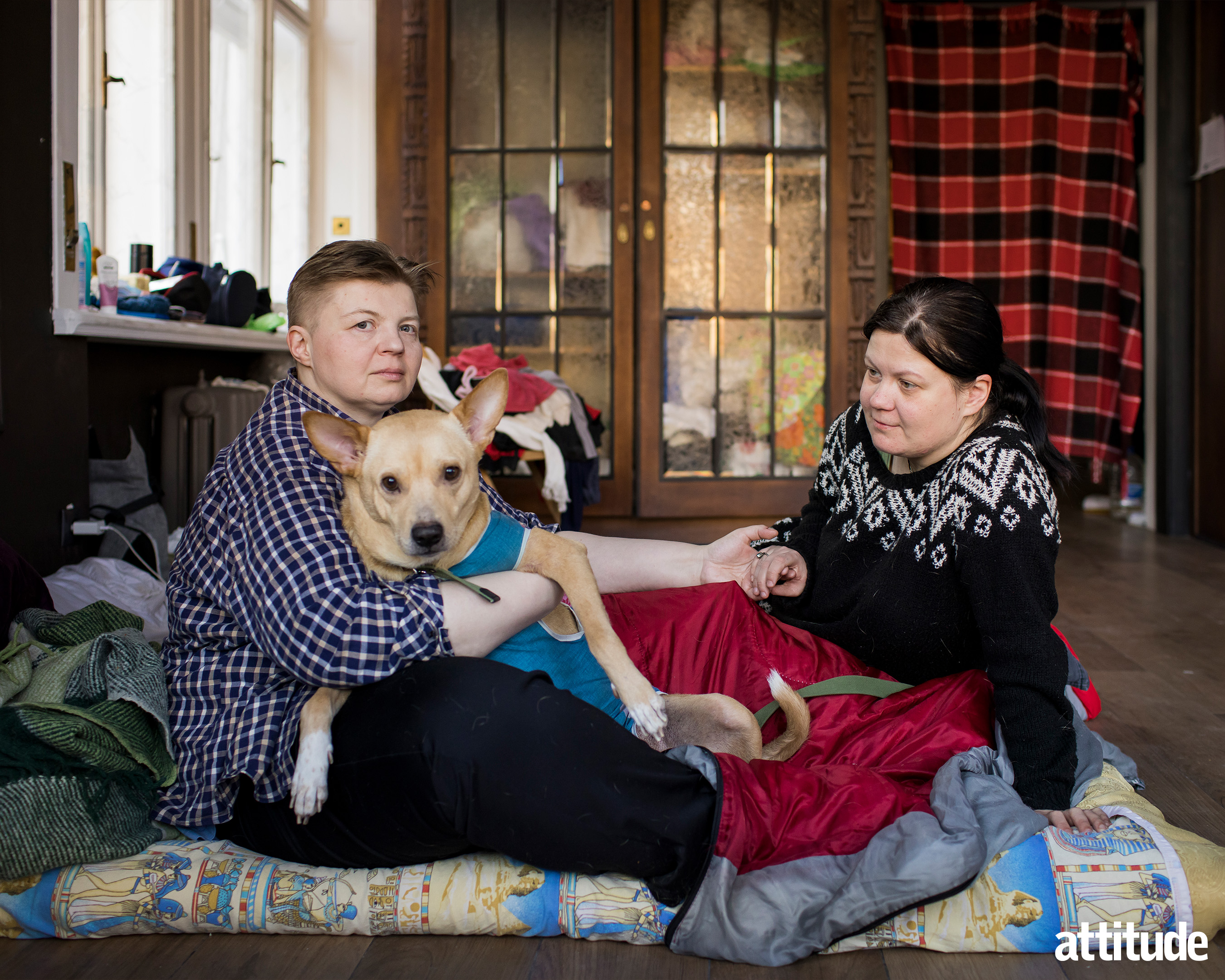
Evgeny and Olesya
Evgeny: We first met in 2012 on a website called Contact. In 2016, we met each other in real life for the first time. I was living in Russia, and I wanted to move to Ukraine because of political reasons. Russia is just not a free country.
Sadly, my mother was sick, so I needed to stay to take care of her. When she passed away, I was free to leave the country, but then the pandemic started and it took a while for me to move to Ukraine.
In March 2021, I moved to Kyiv, intending to live with Olesya. We had really high hopes for the future, and also for Ukraine. We felt that the country might become part of the European Union, and there might be a possibility for us to get married.
When the war started, we were living in our house close to Kyiv. But there is a military base there, so we knew we might be targeted. We stayed during the first days of war, volunteering and helping the territorial defence by cleaning and cooking. But one day Olesya came home saying she had seen snow falling from the sky.
It looked like snow, but it was ashes from a Russian plane which had been shot down by the Ukrainian army. We knew it was time to leave, so we went to Lviv. We only took two backpacks, our dog and our friends’ cat. In the shelter, we sleep on the ground, but we are in a good place.
During this war a lot of the people from the LGBTQI community are in the Ukrainian army. They wear a unicorn mark on their uniform. I think the war somehow brought some of us together; it united us. We believe Russia will not win this war, but if it does the country would have huge problems.
We would lose our freedom. We stay in Ukraine because we believe in Ukraine as a country, even now that the Russians are threatening the LGBTQI community. It feels like we are being targeted more and we know Russia does not tolerate us.
Olesya: If the war ends, we will go back to our own city to rebuild it. If the war continues, we won’t be able to stay in Lviv. We will search for safety abroad in another country, somewhere LGBTQIs have more rights — definitely not a Soviet country. We would go to Germany, the Netherlands, Sweden or Norway.
These are countries where the laws are gender-free. We want to be in a country where same-sex couples are not judged by heterosexual people. There is a possibility that Evgeny will get deported back to Russia because his short-stay permit expires soon. This would be a nightmare; I don’t want to be alone here.
Currently, in this country I am afraid to tell people I am LGBTQI. A lot of my colleagues are homophobic and would react aggressively towards me if I came out. My family also does not know.
During the Pride month a few years back, we were surrounded by men from an ultra-right-wing group. They beat us up and broke our friend’s fingers. The police were right there and saw that her fingers were being broken, but they did not do anything. Ukraine is a very homophobic country, but in the past couple of years it had got a little better.
The Attitude May/June issue is out now.
